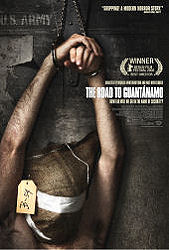Apparently that analogy I was handed about the end of Brett Ratner’s X-Men 3: The Last Stand (20th Century Fox, 5.26) being a bit like the finale of The Wild Bunch was not on the mark. Here’s what Maxim critic Pete Hammond says, having recently seen it at on the Fox lot: “While there’s a considerable amount of violence in the final battle scene plus a couple of others, it’s not of the Sam Peckinpah variety but more in line with what we’ve all come to expect from these films. What astounded me is apparently Fox is determined to end the series with this one. It’s flatly stated in the first line of the press notes: ‘….the climax of the X-Men motion picture trilogy.’ Apparently there will be spinoffs including a Magneto film (Ian McKellen, great here again and by the far the best thing in The DaVinci Code) movie that is listed as ‘announced’ on IMDB as is Wolverine for Jackman, but who knows? There are definitely some surprising twists in Brett Ratner’s film but perhaps the best of all is saved for absolute last in an end sequence after the final (endless) credits roll. Fox publicists told the handful of people at the screening to stay all the way through and it was worth it. (I’m usually the last person in the theatre when the lights come up.) I think Ratner put this last bit in there for the true fans. He’s done an excellent job taking over for Bryan Singer, keeping the humanity and tone of the first two and adding his own thing. The action scenes are dynamite. For me this was the best of the three films. It will be interesting to see the reaction when it screens on Monday in Cannes and at the all-media screening [in Los Angeles].”
So the name Paramount Classics is more or less out (i.e., put on the back burner, relegated to a lower status, etc.) and a new jazzier-sounding moniker — Paramount Vantage, a creation of company honcho John Lesher (pictured below) — is in.

Does this mean the company is going to be making and/or releasing fewer esoteric, out-there films? One presumes as much. Is the idea to try and be successful like Fox Searchlight was in ’04 and ’05, or ultimately be more like the genre-milking Rogue or Screen Gems? Sounds like a mixture of the two, to judge by this statement in the Variety story, to wit: Par Vantage “is set to release a diverse slate of eight to 10 films a year, including “sophisticated films with a strong arthouse sensibility, as well as smaller-budgeted comedy and horror films.”
Dave Lugi, the guy who did that hilarious video about Chris Walken, Joe Pesci, Jack Nicholson and Robert DeNiro auditioning for Snakes on a Plane, has struck again…this time with the guys (minus De Niro) co-hosting American Idol/
The festival is cranking up now and the things-to-get-done list is starting to overwhelm. Fissures of sea water are starting to shoot out from the dike. Once Cannes starts rolling it’s about one aonizing decision after another…see this and you miss out on that. All you have to do is hesitate a little bit and suddenly you’re behind the eight ball. I’ve only seen five films over the past two days — Ken Loach‘s The Wind That Shakes The Barley, Lou Ye‘s overpraised Summer Palace, Richard Linklater ‘s Fast Food Nation, Pedro Almodovar‘s Volver and the surprisingly spritzy anthology film Paris Je’taime …and yet I’ve written stuff about only two of them. Now it’s 4:35 pm, which is only got an hour and a half until this Paramount Vantage launch party starts at 6 pm on the beach (which means having to blow off the 6 pm screening of Andrea Arnold’s Red Road). And then there’s the Dreamgirls shindig at 8 pm. Maybe I’ll jump back and do some more filing from 10 pm to midnight, which is when the Fast Nood Nation party begins. I know, I know…eliminate the parties and you’ll start to see light breaking through the clouds.
Richard Linklater‘s Fast Food Nation, which screened at the Cannes Film festival yesterday afternoon at 5 pm, is Traffic with meat. Based on Eric Schlosser ‘s best-selling nonfiction “Fast Food Nation”, it’s a sprawlingly ambitious ensemble drama (i.e., meaning it’s not a documentary) about how different people at different economic stratas are coping with or reacting to the gastronomic yuck factor at the core of the fast-food industry . If Super-Size Me put you off McDonald’s, wait until you see this puppy. Yet another in a fascinating run of political films that are suddenly pouring out of Hollywood these days, Fast Food Nation isn’t without flaws. It meanders a bit and isn’t exactly strung tight with story tension, but it’s an agreeable meandering. I was so “with” this film and what Linklater was up to in his rambling-shambling way that I forgave the frilm for its occasional detours that don’t quite pay off. Others have been telling me they think FFN has too many loose story strands, others feel as I do, and still others are creaming over it. N.Y. Times critic Manohla Dargis is calling it “devastating” and “ferocious” and “the most essential political film from an American director since Michael Moore’s Fahrenheit 9/11.” (Manohla showed up for the early afternoon Fast Food Nation press conference today, and she rarely attends press conferences, so there you go.) A woman I know just walked in and said some people didn’t like it “because of all the blood.” That’s the single dumbest thing I’ve heard so far from anyone at this festival. The slaughterhouse killing-floor sequence comes only at the end, and is obviously justified, necessary and non-gratuitous. Some of the characters feel under-written, but restrained, lived-in performances are given uniformly by Gregg Kinnear, Catalina Sandino Moreno, Bruce Willis, Ethan Hawke, Patricia Arquette, Paul Dano, Esai Morales, Wilmer Valderrama, Kris Kristofferson, Ashley Johnson, Lou Pucci, Jr., Luis Guzman, Avril Lavigne, Ana Claudia Talancon and Bobby Cannavale.

(a) Carmen Maura, Penelope Cruz and director Pedro Almodovar at this morning’s Volver press conference — Thursday, 5.18.06, 3:40 pm; (b) Glistening beach-bay view from American Pavillion — Friday, 5.19, 11:40 am; (c) Astoux & Brun, an excellent seafood restaurant at foot of hilly “le Suquet” section near Hotel de Ville — Thursday, 5.18.06, 11:45 pm; (d) Something about the milky light in this otherwise uninteresting shot taken in the lounge of the Orange cafe; (e) waiting for entrance into the Debussy theatre for screening of Paris Je’taime — Thursday, 5.18, 7:45 pm; Fast Food Nation costars Gregg Kinnear, Catalina Sandino Moreno, Wilmer Valderamma at this afternoon’s Palais press conference — Friday, 5.19.06, 12:38 pm
Three days ago a Rachel Abramowitz L.A. Times piece asked if screenwriter Akiva Goldsman had managed to “pull it off” with his script of The DaVinci Code. 72 hours ago….amazing.
To go by the Cannes reactions to The DaVinci Code you’d think there isnt a critic in the world who likes it. But there are three critics giving it positives on Rotten Tomatoes — the New York Post‘s Lou Lumenick, the Chicago Sun Times‘ Roger Ebert and Eleanor Ringel Gillespie of the Atlanta Journal-Constitution. As a result, Ron Howard’s film has a 21% positive rating. Not much, but it’s something.

(a) Catherine Deneuve adorning the west-facing side of Cannes’ City Hall, a.k.a., the Hotel de Ville — Thursday, 5.18.06, 7:55 am; (b) Area about two blocks from Grand Palais in the early morning — Thursday, 5.18, 8:05 pm; (c) the “Old Town” section of Cannes, otherwise known as “le Suquet” — Wednesday, 5.18.06, 7:45 am; (d) Grand Palais just prior to this morning’s screening of Ken Loach’s The Wind That Shakes the Barley — Thursday, 5.18, 8:10 am; (e) the red-carpet entrance to the Grand Palais — Thursday, 5.18, 8:13 am; taken inside the great DaVinci Code pyramid toward the end of last night’s (5.17) opening night party — look closely and you’ll see five or six guys hanging on metal beams near the top; they all jumped off and swung around on bungee cords
The Washington Post‘s Philip Kennicott reported yesterday that the Motion Picture Association of America has censored a lobby poster for Michael Winterbottom and Mat Whitecross‘s The Road to Guantanamo, a highly praised film about the U.S. detention facility at Guantanamo Bay, Cuba. Half-drama and half-doc, it’s scheduled to open in the U.S. on 6.23.


“The image that ran afoul of the MPAA is tame by the standards set by the amateur photographers of Abu Ghraib,” Kennicott wrote. “It shows a man hanging by his handcuffed wrists, with a burlap sack over his head and a blindfold tied around the hood. It has appeared in advertisements for Guantanamo, a documentary with some reenacted scenes, that follows the fate of three British men imprisoned at Guantanamo for more than two years before being released with no charges ever filed against them. U.S. distributor Roadside Attractions “submitted the poster to the MPAA, which must approve publicity materials for the films it rates, on 4.24. It was rejected the next day. ‘The reason given was that the burlap bag over the guy’s head was depicting torture, which wasn’t appropriate for children to see,’ said Roadsdie co-president Howard Cohen. The film will open on 6.23 with another poster, approved by the MPAA, which shows only a pair of shackled hands and arms. Gayle Osterberg, a spokesperson for the MPAA, said its standards for print advertising are particularly sensitive. ‘If it’s a poster that’s hanging in a theater, anyone who walks into that theater, regardless of what movie they’ve come to see, will be exposed to it,’ said Osterberg. While she wouldn’t comment on the particular reason for the poster’s rejection, and while MPAA guidelines for what is acceptable in advertising aren’t made public, she did list some of the things that are not allowed: ‘depictions of violence, blood, people in jeopardy, drugs, nudity, profanity, people in frightening situations, disturbing or frightening scenes.’ Cohen says he understands why the MPAA exercises control over advertising materials — he’s a father himself. But that doesn’t diminish his frustration with the decision. ‘This is a film with a serious purpose, and this is the subject of the film itself, and the marketing materials were appropriate to the subject,’ he said. And, he added, horror flicks and slasher movies are often advertised with images far more suggestive of graphic violence.”
Yesterday at the American Pavillion I spoke briefly to music composer Tim Truman, who worked for Miami Vice director Michael Mann n in the ’80s on the Miami Vice TV series and also on L.A. Takedown, the 1989 TV movie that Mann remade as Heat in ’95. Truman’s IMDB history indicates he hasn’t been in Mann’s employ for quite a while since, but he may have a reliable source or two in the Mann camp. I’m saying all this because Truman claimed that the cost of Miami Vice (Universal, 7.28) is in the range of $180 million bucks. I thought I read somewhere that the cost was more like $125 million, but we all know how actual costs are often kept under wraps. This is all just “loose talk” and shouldn’t be taken to the bank, but it aroused my curiosity. How in the practical world could a contemporary high-tech cop thriller cost anything like that amount? No big-time special effects, no period dressings…seems dubious. If anyone knows anything solid or has a counter-figure of any kind, please advise.
HE readers seeing The DaVinci Code this weekend might want to think about an echo element regarding Audrey Tatou‘s Sophie character. I’m speaking of similarities to a certain film that came out last summer about a very rich guy who goes around wearing a cowl and a cape. Just a thought…

